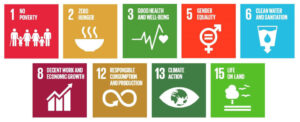Sustainability is a growing trend across all industries. More consumers are asking what are the origins of the products they are buying and are giving high value to ethical businesses.
Companies are becoming aware of this trend so we see more often their Corporate Social Responsability or sustainability reports in which they claim a commitment towards responsible production, sourcing practices, and positive impacts on the environment, society and economy.
In the gold industry, sustainability and transparency are especially relevant, given the context and the issues related to the extraction of gold worldwide, such as unfair labour wages, child labour, and environmental harm.
The Fairmined initiative becomes an ally for companies that are working hard to improve their sustainability strategies. Sourcing Fairmined certified gold means supporting the development of thousands of small-scale mining communities and contributing to improve issues such as their health, education and general well-being.
We encourage the gold industry to include Fairmined certified gold in their sourcing models and to work together towards the fulfilment of the United Nation’s Sustainable Development Goals which aims to end poverty, protect the planet, and ensure that all people may enjoy peace and prosperity.
Here, we summarize the benefits that the Fairmined Certification brings to the artisanal and small-scale mining gold sector and how it is contributing to the 2030 United Nation’s SDGs. (This article was originally written by Jairo Cardenas from the Alliance for Responsible Mining)
You can also contribute to offering these benefits to mining communities while strengthening your sustainability strategy:
- The environmental actions promoted by the Fairmined Standard, such as the responsible use or complete elimination of mercury, responsible use of toxic substances, and implementation of environmental plans, builds awareness in the industry of the environmental impacts it can cause when carried out without any type of monitoring. Once awareness is raised, better environmental practices become implemented.
- The Fairmined Standard is a tool that provides a good opportunity for the artisanal and small-scale mining sector, by promoting good labor, social, legal, and environmental practices, among others.
- Compliance with the Fairmined Standard helps creating stable and decent employment under adequate safety conditions, providing the workers job stability that leads to a stable economy.
- The Standard’s requirements also enable workers to earn fair wages, higher than both the threshold for extreme poverty as defined by the United Nations and the monthly minimum wage set by Colombian regulations.
- Achieving compliance with the Fairmined Standard is an incentive and aid for the small-scale mining sector to fulfill the regulatory requirements they must implement in their mineral extraction, processing, and transformation processes, resulting in a formalization of their activity that benefits everyone involved.
- Sales of gold under the Fairmined Certification receive a price premium that positively impacts workers, their families, and the entire community that otherwise have scant resources. The premium goes towards paying higher incomes to employees and improving conditions of the mine and surrounding environment, in summary injecting additional funds that benefit the sector.
- Implementing the Fairmined Standard generates positive impacts for the region’s economy by creating a stable economic movement that improves conditions not only for the workers or miners, but also for commerce and transport in general across the municipality.
- Workers participating in the Fairmined Certification system receive adequate health coverage, so that they and their families can access medical care when needed, thus reducing mortality and morbidity rates in the region.
- The Fairmined Standard supports and promotes good labor practices that place workers as the priority. Adhering to the Standard means implementing various measures to protect workers’ health and maintain safe work sites that allow workers to adequately perform their job functions.
- The good practices of gender equality, non-discrimination, decent work, and protection of human rights are all promoted by the Fairmined Standard, which requires that they be implemented at the organizational level and internalized by each member involved in the certification process.


